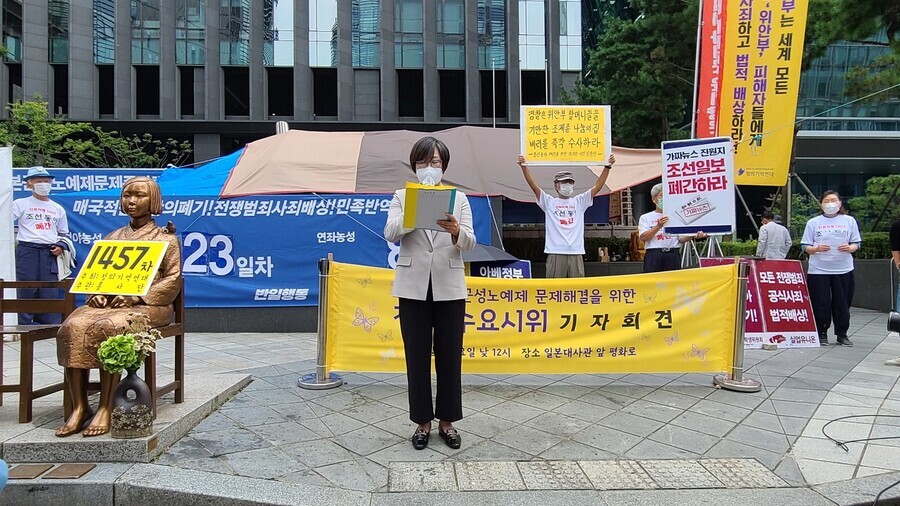hankyoreh
Links to other country sites 다른 나라 사이트 링크
S. Korean activists, former comfort woman Lee Yong-su push back against calls for removal of Statue of Peace

“It is Lee Yong-su’s belief that the calls to take down the peace statue -- which is a symbol of world history and the resolution of human rights issues -- are absolutely unacceptable.”
Demonstrators gathered at midday on Sept. 16 beside the Statue of Peace, depicting a young girl who symbolizes victims of military sexual slavery, in front of the former Japanese Embassy in Seoul’s Jongno District to voice their opposition to the statue’s removal. During the 1,457th regular “Wednesday demonstration for the resolution of the Japanese military sexual slavery issue” that day, Lee Yong-su, a 92-year-old “comfort woman” survivor who has played a leading role in the campaign for peace and human rights, read out a letter that she had written. It contained her personal rebuttal of calls for the statue’s removal by Japanese far-right figures, citing accounting improprieties by the group Korean Council for Justice and Remembrance for the Issues of Military Sexual Slavery by Japan.
In her letter, Lee wrote, “The statue is a witness to history, and to call for its removal is wickedness. [These figures] are historical criminals.”
“The statue represents the bitterness and grief of the victims and the heart of education for future generations,” she stressed.
In addition to criticisms of the Japanese far right, the Wednesday demonstration also shared concerns about Yoshihide Suga, who has taken office as Japan’s new prime minister. Commenting on Suga, Korean Council President Lee Na-young said, “While he may not be the historical revisionist that [predecessor Shinzo] Abe was, he has shared a position reiterating the Abe administration’s argument that the 1965 Claims Settlement Agreement constitutes the foundation of South Korea-Japan relations.”
The Korean Council urged the newly launched administration in Japan to take proactive steps to resolve the issues of comfort women and forced labor mobilization.
“A path to true peace and coexistence will open up when [Japan] sincerely confronts not only the Japanese military comfort women issue but also the matters of forced labor mobilization and various war crimes,” Lee said.
“We strongly urge the Suga administration to move closer to a resolution on these issues,” she added. The Korean Council called on the Japanese administration to “formally apologize, provide lawful compensation, and provide truthful education to future generations.”
The speakers that day also took aim at prosecutors’ indictment of Democratic Party lawmaker and former Korean Council president Yoon Mee-hyang on charges of embezzlement in the course of her duties, which they criticized as “far-fetched.” Yoko Shiba, co-president of the National Movement for Resolving the Issue of the Japanese Military Comfort Women, issued a statement saying that “by indicting [Yoon for other charges] on farfetched grounds even when they admitted they had not discovered evidence [for other charges that were not pressed], the prosecutors appeared to be acting simply to save face.”
By Kang Jae-gu, staff reporter
Please direct comments or questions to [english@hani.co.kr]

Editorial・opinion
![[Editorial] Penalties for airing allegations against Korea’s first lady endanger free press [Editorial] Penalties for airing allegations against Korea’s first lady endanger free press](https://flexible.img.hani.co.kr/flexible/normal/500/300/imgdb/original/2024/0502/1817146398095106.jpg) [Editorial] Penalties for airing allegations against Korea’s first lady endanger free press
[Editorial] Penalties for airing allegations against Korea’s first lady endanger free press![[Editorial] Yoon must halt procurement of SM-3 interceptor missiles [Editorial] Yoon must halt procurement of SM-3 interceptor missiles](https://flexible.img.hani.co.kr/flexible/normal/500/300/imgdb/child/2024/0501/17145495551605_1717145495195344.jpg) [Editorial] Yoon must halt procurement of SM-3 interceptor missiles
[Editorial] Yoon must halt procurement of SM-3 interceptor missiles- [Guest essay] Maybe Korea’s rapid population decline is an opportunity, not a crisis
- [Column] Can Yoon steer diplomacy with Russia, China back on track?
- [Column] Season 2 of special prosecutor probe may be coming to Korea soon
- [Column] Park Geun-hye déjà vu in Yoon Suk-yeol
- [Editorial] New weight of N. Korea’s nuclear threats makes dialogue all the more urgent
- [Guest essay] The real reason Korea’s new right wants to dub Rhee a founding father
- [Column] ‘Choson’: Is it time we start referring to N. Korea in its own terms?
- [Editorial] Japan’s rewriting of history with Korea has gone too far
Most viewed articles
- 1Months and months of overdue wages are pushing migrant workers in Korea into debt
- 2[Editorial] Penalties for airing allegations against Korea’s first lady endanger free press
- 3Bills for Itaewon crush inquiry, special counsel probe into Marine’s death pass National Assembly
- 4Trump asks why US would defend Korea, hints at hiking Seoul’s defense cost burden
- 560% of young Koreans see no need to have kids after marriage
- 6S. Korea discusses participation in defense development with AUKUS alliance
- 7[Reporter’s notebook] In Min’s world, she’s the artist — and NewJeans is her art
- 8Korean firms cut costs, work overtime amid global economic uncertainties
- 91 in 3 S. Korean security experts support nuclear armament, CSIS finds
- 10[Guest essay] Maybe Korea’s rapid population decline is an opportunity, not a crisis